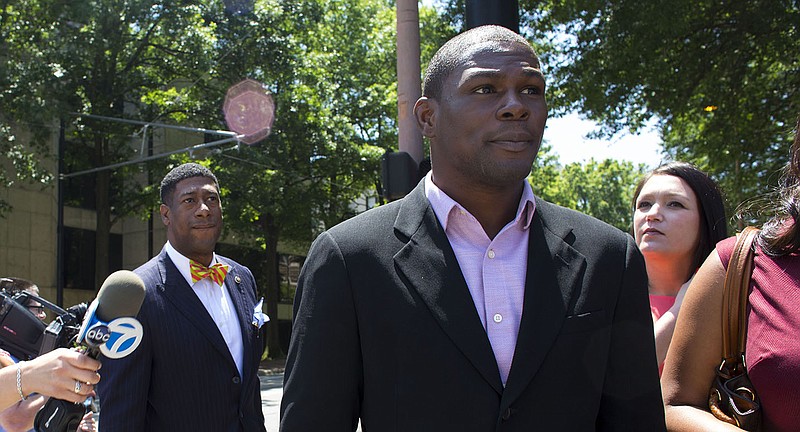An 11-woman, one-man Pulaski County jury on Wednesday rejected the bulk of the accusations against former boxing champion Jermain Taylor, clearing him of felony terroristic threatening and reducing the felony domestic violence charge to a misdemeanor.
Ending the two-day trial, jurors took about four hours to reach their verdict, guilty on two counts of two misdemeanor domestic violence. The finding reduced the maximum penalty the Olympic champion faced from 30 years in prison as a repeat offender to one year behind bars, a sentence jurors imposed after about 45 minutes.
They further called on Taylor, who fought under the nickname Bad Intentions, to get medical treatment after hearing testimony about the life-altering brain injury he suffered in an October 2009 bout in Germany, which caused him to leave boxing for 26 months.
In a separate proceeding, Circuit Judge Leon Johnson imposed a three-year concurrent prison term on the 43-year-old Arkansas Sports Hall of Famer. Johnson ruled that Taylor's domestic violence crimes violated the conditions of the six-year suspended prison sentence the judge imposed in May 2016 after Taylor pleaded guilty to nine felony charges, six counts of aggravated assault, two counts of terroristic threatening and single counts of second-degree battery. Taylor faced up to 54 years on those charges. He will be parole eligible in three months.
Taylor's convictions stemmed from crimes committed over about 8½ months from late August 2014 to mid-May 2015, beginning with Taylor shooting his cousin, Tyrone DaWayne Hinton, while threatening the life of Hinton's son, Aharon Coley, at Taylor's then-home -- a 39-acre estate outside North Little Rock and Maumelle. Taylor was three months into his pro boxing comeback.
Five months later, Taylor put a gun to the head of Thelton Pegro Smith and fired the weapon in front of Smith's wife and three children just after Little Rock's January 2015 Dr. Martin Luther King Jr. parade. Taylor had gotten angry after one of the Smith children, who had been allowed to hold Taylor's championship belt, dropped it.
Four months after that, Taylor, enrolled in an inpatient drug rehabilitation program, punched another patient, Jason Isaac Condon, in May 2015, knocking him unconscious and inflicting facial fractures. Taylor would later confidentially settle lawsuits brought by those victims.
At trial this week, Taylor was accused of attacking his ex-girlfriend in an August 2018 jealous rage over a comment she had made to a neighbor. The woman told jurors that Taylor slapped her, threw against a wall, choked her and threatened her life with a hunting knife before abandoning the attack and leaving, giving her a chance to call 911.
Taylor's lawyers suggested in closing arguments Wednesday that the woman, 43-year-old Labiba Sutton of North Little Rock, might seek her own settlement, pointing out that she has hired a lawyer to investigate the possibility of suing Taylor once the criminal proceedings are concluded.
The 2000 Olympic bronze medalist now claims to be indigent, and he was represented at trial by public defenders.
In his November 2018 application for publicly funded representation, Taylor reported that he had not worked in two years, and that his sole income then was a $10,000 check plus a $1,000-per-month rental house worth $290,000. Further, he reported owing $400,000 on his own home and loans, while paying $6,000 monthly for child support for six of his eight children.
Taylor's attorneys, Lou Marczuk and Harrison Tome, argued further that prosecutors failed to provide sufficient evidence, while also attacking Sutton's credibility.
"You should have a lot of questions in your mind," Marczuk told jurors. "Where are the clothes that [supposedly] had blood on them? If there were neighbors outside, and she was screaming, why aren't they here? If there's some kind of medical proof [of injury], they're not here."
Sutton claimed to have been threatened at knifepoint by Taylor, but jurors only saw a photo of the weapon, and they should wonder why prosecutors did not show them the actual blade, the public defender said.
The defense also attacked Sutton's credibility, telling jurors she had changed her story about what had happened at the Taylor home back in August 2018 when police arrested the boxer after finding Sutton bruised and bleeding in the residence after she called 911 to report Taylor had attacked her.
"Ms. Sutton said many things, many different times," Marczuk told jurors.
Deputy prosecutor Reese Lancaster urged jurors to find Taylor guilty as charged, telling them Sutton had been through a very real ordeal at the boxer's hands, with any memory lapses minor and due to the length of time passed since the event.
"She tells you that because it's the truth," Lancaster said, pointing at Taylor. "This happened by his hand."
He and fellow prosecutor Michael Wright asked jurors to remember Sutton's 911 call to police, made after Taylor had finally given up slapping and choking her. The recording was the first piece of evidence the prosecution had presented to jurors.
"Those are the real-time words," Lancaster said, repeating what Sutton had told dispatchers in her call for help. "'My boyfriend Jermain Taylor hurt me. He has a knife.' Listen to the raw emotion. We usually don't have that [type of evidence]."
Taylor did not testify or call any witnesses to rebut the accusations by Sutton. At sentencing jurors heard from insurance executive Andrew Meadors, who had been Taylor's business manager for about 10 years during his boxing days, and Little Rock police Sgt. Dennis Moore, who has known Taylor since he was in sixth grade and helped him find his talent as a boxer.
They recounted Taylor's rags to riches ascent from impoverished childhood in gang-riddled neighborhoods to the pinnacle of boxing as Olympic champion and the world's undisputed middleweight champion before the crippling injury in the ring that Moore said left Taylor a changed man.
The men agreed that Taylor should never box again but said he could still recover, given the opportunity to become a great man again.

